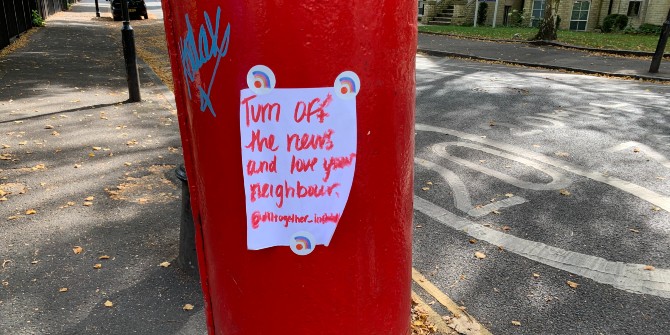The fair innings argument proposes that we should all be entitled to a “good” life – which, for simplicity, can approximated by how long it lasts. Most current policy responses to COVID-19 are at odds with this notion of equality over the course of one’s lifetime, argues Paul Dolan (LSE). They do not pay enough attention to the ages of all those who will die as a result of pandemic suppression policies. Policymakers need to urgently provide estimates of which groups will die prematurely as a result of their decisions.
COVID-19 is causing widespread mortality and misery around the world. The one crumb of comfort, if it’s possible to say that about a deadly virus, is that the risks of mortality are highly correlated with age. In the UK, over half of the deaths from COVID-19 so far have been people over 80 and less than 1% of deaths have been people under 40. Whilst it is sad when an 80-year-old dies, it is both sad and tragic when a 40-year-old does. There are two main reasons for this. The first is the “future losses” argument. The 80-year-old has died about 9 years earlier than they might otherwise, whereas the 40-year-old has lost about 42 years of future life, and so the individual and society lose more from the 40-year-old’s death. The second is the “fair innings” argument. The 80-year-old has already lived a long life, whereas the 40-year-old has had theirs cut short, and so it’s unfair if the 40-year-old dies.
My academic mentor at the University of York in the 1990s was Professor Alan Williams. He was a passionate advocate of the egalitarian principle that everyone is entitled to some ‘normal’ span of health (usually expressed by life years) and “anyone failing to achieve this has been cheated”. He was in his 60s when I met him, and he died in 2005 aged 77. He felt very lucky to have lived a relatively long and full life. I was in my 20s then and am in my 50s now and my support for the fair innings argument grows stronger with each passing year. Several empirical studies have shown that the general public broadly agree with us. In one of my own studies, for example, which controlled for future losses by asking people to prioritise a fixed five-year gain in life expectancy for people at age 5, 20, 35, 55 and 70, 96% of people had one of the three youngest ages ranked first. Having “lived less life” was the main reason for prioritising younger people.

Now, you might say that all this amounts to ageism. And it does. But not all isms are unfair, at least not over the lifetime. Giving priority to a 40-year-old over an 80-year-old now means that, in 40 years’ time, the current 40-year-old will be given less priority when they are an 80-year-old (assuming they are lucky enough to live that long). Whilst white people will never be black and vice versa, all of us will be all ages until our death. This makes an intrapersonal comparison (weighting mortality risks differently at different stages) morally justifiable in a way that an interpersonal comparison (the different weighting of mortality risks by race) is not. Of course, it is awful that Covid-19 has come along now but we cannot rule out another pandemic in the next 40 years, and that one may not be as respectful of fair innings ageism as Covid-19.
Contrast the burden of Covid-19 with the impact of the policy responses of most governments around the world. These have focussed overwhelmingly on suppressing the virus to limit the number of deaths from Covid-19 e.g. by shutting down great swathes of the economy and closing schools. These policy measures are completely understandable and could serve to enhance social welfare in the short-term as they allow for acute care, testing, and other systems to adapt (and as they result in fewer deaths from road traffic accidents and air pollution). But they pay insufficient attention to the ages of all those who will die as a result of suppression policies (from healthcare resources being diverted, unemployment, lower tax revenues for public services, domestic and child abuse, suicide, and so on).
As various types and degrees of lockdown will continue for a while yet, it becomes ever more important that policymakers provide some estimates of which population subgroups will die prematurely as a result of their decisions, and how prematurely. Like any egalitarian over the lifetime, it matters to me greatly just how many people are being cheated out of their prospects of a fair innings. If Alan Williams were alive today, he would be 92 and, more than anyone, would be demanding to know.
This post represents the views of the author and not those of the Covid-19 blog or LSE. Image: License to use Creative Commons Zero – CC0.
Paul Dolan is Professor of Behavioural Science at the London School of Economics.






Paul how can we get our political leaders to change direction and be more pro-young? Are the young stuffed until the electoral arithmetic changes?
Perhaps the key is for the old to stand up for what’s right, but that doesn’t seem likely.
This “fair innings” argument does not fly with me, as it does not represent real life. Not all 40-year-olds will make it to their next birthday, and women in my family, going back generations, have lived well into their late 90s. So, to use the “fair innings” argument and decide that a woman who most likely would live at least ten more years should not receive care, while a reckless 40-year-old who will most likely not see one more year, is ludicrous.
The Delta variant of COVID-19 is attacking children and the young. They are dying, not just the old. Now what? How does the “fair innings” argument work now. Those who receive treatment should be weighed on a larger scale. Those who receive a bed should also be weighed on a larger scale.
If my 80-year-old mother has been vaccinated and followed all of the scientific community’s recommendations and needs a bed due to a heart attack, and a 40-year-old is not vaccinated, has not followed the recommendations set forth by the scientific community, is a COVID denier, and refuses to wear a mask and socially distance themselves and they get COVID-19, they should NOT be prioritized. So what if they could live 40 more years. Their actions prove otherwise.